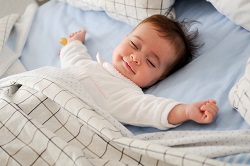

This article is for informational purposes only. We will not help to get rid of the problem of enuresis (urinary incontinence) in children. Rather, the purpose of this article is to help parents figure out whether there is a problem or not, whether it is worth sounding the alarm or not. Sometimes parents worry when it's too early to worry. And it happens vice versa. Parents do not think that the problem is actually serious and requires the intervention of specialists. Much depends on the age of the child. For example, what is a problem at seven years old is most often not a problem at one and a half years.
The child is not yet two years old
No child is born with the ability to control the sphincters of the bladder and, accordingly, go to the potty. The sphincters mature at about two years of age. Therefore, if a child of one and a half to two years old pees exclusively in his pants, and the pot in the family is an interior item, then there is no reason for concern. Most often, the problem is created by parents or grandparents who compare the child with other children or with themselves in early age. So, grandparents add fuel to the fire, who talk about how their own children (the baby's parents) went exclusively to the potty a year. The reason for the inability of the baby to use the potty is usually called disposable diapers. Do not take on faith the words of grandparents. They were young parents for a long time and much has already been erased from their memory. So, it is quite possible that their own child learned to use the pot after all, not in a year, but later: in two or even three years.
So, if the child is under two years old, then there is definitely no cause for concern.
Child two or three years old
But the child is growing up. He is almost three years old and still does not use the potty, although most of his peers have already learned to control the process of urination. Indeed, most children under the age of 2.5 learn to pee in the potty. But not all. And if the child is healthy, then this is a variant of the norm. But how do you know if the baby is healthy? Contact your pediatrician, take a urine test, do an ultrasound of the bladder and kidneys. You can also get a consultation with a nephrologist (this is not necessary, but it will not be worse). If there are adults in the family who suffer from diseases of the kidneys or bladder, then a visit to the doctor is simply necessary.
If, according to the results of the analyzes, any problems are identified, then it is quite obvious that medical treatment is necessary. If it turns out that the child is healthy, then it’s still good that you made a diagnosis. Now you know for sure that the child is somatically healthy and it remains to wait patiently, accustoming him to the toilet.
Child four or five years old
But the child grows up, but the problem remains. Most often it happens that a child during the day learns to control the sphincters of the bladder, and at night it is written. Many parents (especially parents of boys) do not worry until the age of five or six, or even seven, believing that the child will definitely “outgrow” the problem. Why boys? The fact is that there is a myth that it is normal for boys to write before the age of five, but for girls this bar is somehow lower. Therefore, the parents of girls begin to sound the alarm at 4-4.5 years.
If a four-year-old child pees rarely (for example, once a month), then most likely there is no problem, it’s just that children can’t always wake up at night. Also, do not worry if, for example, the child drank too much water at night, ate watermelon and wet the bed once. It happens that children pee if they have received too many impressions during the day (for example, after a birthday). In this case, we are not talking about enuresis. If, against the background of complete somatic health after four years, the child pees during the day or at night more than once or twice a week, then you should not wait. It is better to consult a specialist. Only in this case, not to the doctor (after all, we are talking about a healthy, examined child), but to a psychologist.
Let's not touch possible reasons enuresis. The reasons can be very different. And it will really be better if a specialist examines exactly your situation and starts working.
Enuresis appeared unexpectedly
And here is another situation. A child, already accustomed to the potty, suddenly begins to write (most often at night). This is secondary enuresis. In this case, first consult a doctor to exclude somatic diseases (inflammation or other problems). If the child is healthy, then work with a psychologist is necessary. Probably, we are talking about neurotic enuresis. Children react sharply to stressful situations: the divorce of their parents or admission to school. And one of the options for responding to stress can be enuresis. It also happens that the reason is not obvious. Parents did not divorce, there are no quarrels in the family. However, seemingly insignificant changes in a child's life can provoke a problem. Don't expect enuresis to go away on its own. It is better to consult a psychologist.
What not to do
It happens that parents do not turn to specialists and try to solve the problem on their own. For example, they limit the child's water intake in the evening, give herring at night and put her on the potty several times a night. These methods do not help get rid of enuresis. The child does not learn to control the sphincters of the bladder, it is just that his bladder fills more slowly (if there is a restriction in the liquid) or empties (due to landing).
It is important to understand that drinking restrictions do not always contribute to the health of the child and can be harmful. Night landings are more likely to lead to neuroticism, because forced awakening interrupts the natural course of sleep. As a result, the child does not rest fully.
In conclusion, once again we want to draw attention to the importance of contacting specialists - a doctor, a psychologist - and the inadmissibility of self-treatment.
When the baby is still very small, all problems with the toilet are solved by a diaper. It is worn both during the day and at night. If it is of high quality, then the baby will sleep peacefully until morning. However, there comes a time when the child begins to potty train.
There are different methods. Some recommend dropping children off as early as possible, while others are in no hurry to acquire this skill. However, this is followed by a period when the baby is no longer in a diaper. It is then that the occasions during sleep begin to happen. In the afternoon, when the child is awake, he himself may express a desire to go to the toilet, or such a moment can be guessed. However, during sleep, it is not always possible to find out exactly when the baby should be planted on the potty. Parents, as well as grandparents, begin to worry about whether everything is in order with the child. And they are wondering how to wean a child to write to bed at night.
Before proceeding to the recommendations and methods, it is necessary to clarify one rather important point in the formation of the body. The child's brain is not able to control the process of urination at the age of less than one and a half to two years. The body is simply not yet mature enough to control its urges. Incontinence during the night, as well as during daytime sleep, is an absolutely normal phenomenon in children whose age does not exceed six years. According to statistics, even after overcoming the 6th year of life, about ten percent of children still periodically experience such problems. There is no other way to call this phenomenon. really becomes a problem sooner or later.

All family members are excited about the question of how to wean a child to write to bed at night, as this brings a lot of inconvenience. The baby's sleep becomes disturbing. He does not want to sleep in a wet state, and he still cannot afford to change the bed. Of course, parents come to the rescue. And in the morning, all family members are affected by the consequences of lack of sleep and a restless night. If the process completely gets out of control, the child begins to be taken to the doctors. As a rule, this brings little results.
How to wean a child to write to bed at night? Where to begin? First of all, it is recommended to simply wait until the child is ready both mentally and physically. Even if children have already learned to control their need to go to the toilet during the day, this does not mean at all that the same thing will happen at night. As they say, everything has its time. In the meantime, it is necessary to take all measures so that this phenomenon does not become a problem.
Thinking about how to wean a child to write to bed at night at any age, you should, first of all, establish a calm atmosphere in the house. After all, the problem can also be psychological in nature. Perhaps there is a fright or night terror, or nightmares that the child has. All this can be triggered by a turbulent environment. If the child attends kindergarten hic, then you should watch him after he returns home. Maybe there are some events that make the baby nervous.
The same thing needs to be clarified if the question of how to wean a child to write to bed at night at an older age is of interest. In the meantime, the psychological state of the baby is improving, it is necessary to secure, for example, a mattress. It is better to use a special cover that prevents the penetration of moisture inside. If the child is still small, then it is convenient to lay it. It will instantly absorb all the moisture, while the bed and the bed will remain dry and clean. Change of linen and pajamas must be prepared in the evening and placed near the bed.
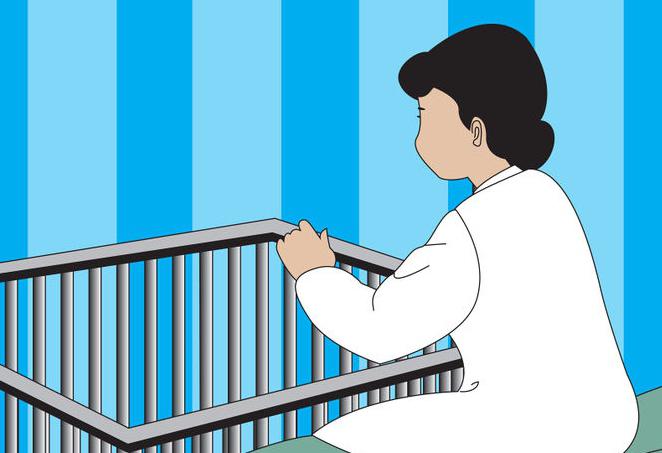
How to wean a child to write at night in bed at 2 years old? Starting to solve the problem, you should initially reduce the amount of liquid that is consumed in the late afternoon. Of course, you need to drink, but it is better to do it in small sips. It's not the quantity that matters, but the frequency. If a child drinks in the last hour before bedtime a couple of times one or two sips, then it is likely that most of the liquid will be absorbed by the body without a trace. It is also recommended to put the baby on the potty just before bedtime, an hour after laying down and even in the middle of the night.
At this age, it is difficult to explain to the child what exactly should be done, so the main responsibility for the routine lies with the parents. According to statistics, a small number of children at the age of two are able to control the process of urination, not only at night, but also during the day. At this time, all problems are solved by putting on a diaper.
A year later, each parent notices what amazing changes occur with the baby. In many ways, he becomes very mature. But this is hardly the case for surprises in bed. So how to wean a child to write to bed at night at 3 years old? It is already necessary to talk with the baby about this topic. By following the recommendations on the drinking regimen, as well as planting the child on the potty according to the advice, you can gradually wean him from writing to bed.
If time passes, but absolutely nothing changes, then parents again ask themselves how to wean a child to write to bed at night. Folk remedies are the best assistant. Many healers recommend turning to herbs for help. However, if a child has an allergic reaction, then such a method can only harm him.
Before using any means, it is imperative to consult a pediatrician. If he allows the use of folk methods, then you can try one of them. For example, if you give your child a diuretic after dinner, by the evening his need and frequency of going to the toilet will decrease. But still, how to wean a child to write to bed at night? Folk methods that help in this matter are different. For example, put your baby in a sea salt bath before going to bed. The water temperature should be within 37 degrees. Salt should be dissolved according to the instructions. Such procedures calm the nervous system, and are also the prevention of urinary tract infections.
You can also take a bath with a decoction of parsley. To do this, steam two tablespoons of the dried plant in half a liter of boiling water. Insist for thirty minutes and add to the bath. It is also useful to use calendula flowers, chamomile, mint, string. After taking a warm bath, the child must definitely go to the toilet and no longer drink before bedtime. Such simple methods may not work immediately. However, if there are no other, serious reasons for bedwetting, then soon this problem will disappear altogether. And the whole family will breathe a sigh of relief.
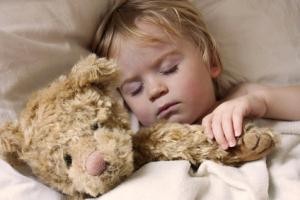
When wondering how to wean a child to write to bed at night at 4 years old, it should be understood that this age is also considered early to control the process of urination. When there is no problem as such, and only occasionally there are occasions that are often associated with drinking a large number fluids before bed, you should not worry at all. If enuresis still torments the baby and worries his parents, then you should visit a pediatrician to find out what is the true cause of this phenomenon.

It happens that the child already completely controlled the process of urination, including at night, when suddenly the problem appeared as if out of nowhere. You should reconsider what could change in the baby's usual daily routine. It happens that the cause becomes quite a common phenomenon. For example, it is very common for children aged five and older to start peeing in bed at night shortly after having a sibling in the family. At first glance, the cause for joy becomes the cause of such a problem.
The fact is that deep in the soul, the baby, most likely, is very worried. Perhaps he is afraid that his parents will stop loving him and paying attention to him. At such moments, despite the complexity of the situation associated with the appearance of a newborn in the house, you should support the older child as much as possible. Parents are encouraged to set aside time that they can spend exclusively with him. It is also necessary to practice joint walks, reading fairy tales and everything that can bring relatives closer. At this moment, you should show the baby all your love, despite the fact that the second child can take most of your time and energy.
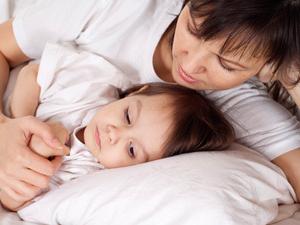
Next age period in children is very important for the formation of the correct regimen. And, as a rule, it is then that parents are interested in the question of how to wean a child to write to bed at night. 5 years is the milestone at which the baby's brain is ready to control urination. Even if at first there will still be troubles, then closer to six years, such a problem should disappear. For this to happen, you must first observe the child.
If bedwetting does not have a permanent character, but happens only occasionally, then this can be considered the norm. At this age, you need to help the baby set his own schedule. To do this, plant it on a pot a few hours after falling asleep. This is the best way to wean a child from peeing at night in bed at 5 years old.
There is a lot of controversy about whether to wake the baby during the process. Some argue that this is a prerequisite for conscious urination, others argue otherwise. How to do it right, in fact, everyone decides for himself. No need to think that if the parents planted the child in a sleepy state on the pot, then he will unconsciously urinate in a dream. If this happens, it is not for this reason at all.
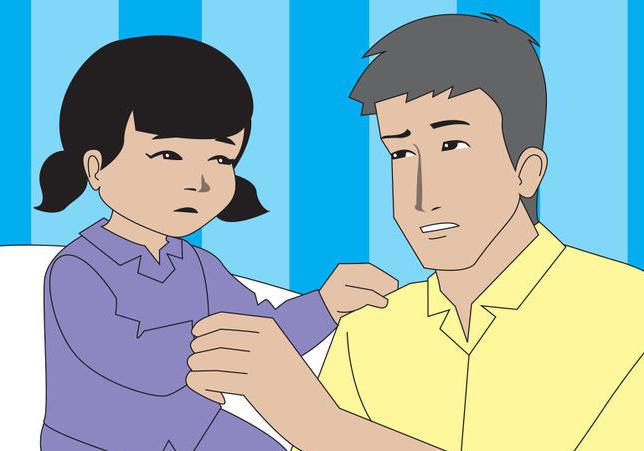
Parents of preschoolers are often interested in the question of how to wean a child to write to bed at night. 6 years is the age when children begin to control their needs on their own. Including nighttime urination. In children who have reached this age mark, the brain signal about this need works quite clearly. However, if the problem still remains, you should definitely consult a pediatrician, as well as exclude the presence of psychological conflicts associated with loved ones in the environment.
Now it’s clear how to wean a child to write to bed at night. The solution to this problem should be approached comprehensively. And you need to start with the usual observation of the behavior of the child. For example, if a child involuntarily touches the genitals during the game, then, most likely, something worries him or interferes with him.
In this case, a thorough examination of the whole body is necessary. Perhaps at some point hygiene was violated, which could lead to inflammation. You also need to observe the child's behavior, whether it has changed. If there is stiffness or nervousness in the movements of the baby, it is necessary to ask very carefully what worries or angers him. All factors that can provoke bedwetting should be excluded. It is also worth considering that this phenomenon is hereditary. Therefore, perhaps you should just wait until the child grows up and copes with his own needs.
Often, bedwetting is a consequence of neurotic situations, that is, it develops due to some kind of mental ill-being or internal failure. Among these reasons is suppression of the will. This is typical for those cases when parents begin to show too high standards towards their baby or are too strict with him, constantly control all his actions and criticize. In such a situation, the child can in no way show his will even in some insignificant moments, he is under constant control.
As a result of this, the child gradually begins to independently control himself, so as not to show his will, since in adults such actions on his part cause discontent. Night is the only time when the baby is left without adult supervision, the baby allows himself to turn off his internal “controller”, which literally became exhausted during the day, as a result of which they perform uncontrolled actions that are characteristic of any little child- he writes.
Moreover, enuresis in children can be caused by a strong sense of jealousy for a brother or sister who has recently appeared in the family. The child notices that parents take great care of the newborn, including those cases when he described himself. Thus, the baby suddenly develops nocturnal, and sometimes even daytime enuresis, despite the fact that the child has long been accustomed to the potty and knows how to use it, and even that he had not previously peed at night.
Most likely, in this situation, enuresis is a manifestation of unconscious envy of the newborn, as well as a desire to receive the same care and affection from the parents.
We solve the problem
If you do not rule out the possibility that jealousy has become the cause of enuresis, you should pay more attention to your baby along with the newborn. It is also necessary to sometimes take him in your arms, put him on your knees, stroke his head, say some kind words and kiss him. It is also worth slowly involving him in the care of the younger child, thus making it clear that for you he is an indispensable assistant.
But, even despite the fact that the mental cause of enuresis has been discovered and eliminated, one should not hope that it will immediately pass, since during the illness the baby could develop a kind of automatic reaction, which is not always easy to cure.
In this case, you can use the old folk remedy. It is necessary to teach the baby to eat a piece of black bread heavily salted with coarse salt during dinner. At night, liquids should not be given in any case. Tea can be drunk for the last time about 3 hours before bedtime. If before going to bed the child still wants to drink, in order to quench his thirst, a couple of sips are enough for him.
What is forbidden to do?
Under no circumstances should you wake your child up in the middle of the night! Wanting to save on laundry, you will damage his psyche and upset his sleep pattern.
It is not necessary to focus the attention of the baby on enuresis, otherwise this deficiency can cause the child to develop feelings of inferiority.
Every family with a baby faces the phenomenon of wet sheets. Usually, by the age of two, the child already begins to ask to go to the toilet consciously and knows how to restrain himself. Sometimes it happens that having learned to go to the potty, the baby again begins to write in bed during sleep. If a similar problem appears in a 4-5-year-old child, then this should cause concern for parents. What to do in this case? How to wean a child to write to bed at night?
Urination in a child during sleep is a problem familiar to many parents. But how to wean the baby from this?Often the problem of a wet bed is associated with the presence of a certain ailment in the crumbs. For example, it can be diseases of the bladder, and sometimes even adenoids. In these cases, bedwetting can only be managed with the help of doctors. Parents should be concerned about the following:
In all these cases, parents must show the baby to the doctor and, if necessary, undergo the necessary examinations.
The situation when a child, who has learned to go to the potty early and refused diapers, again begins to urinate at night, often becomes a consequence of the stress or fear suffered by the baby. In this case, we are talking about a psychological problem, and, most likely, the baby needs the help of a qualified specialist in child psychology.
In such a situation, parents will need maximum patience and attention to the child, he should in no case be scolded and punished. However, even the most caring mother will find it difficult to figure out why the problem arose, to find out what the baby is worried about or afraid of. In this regard, the help of a psychologist is needed.
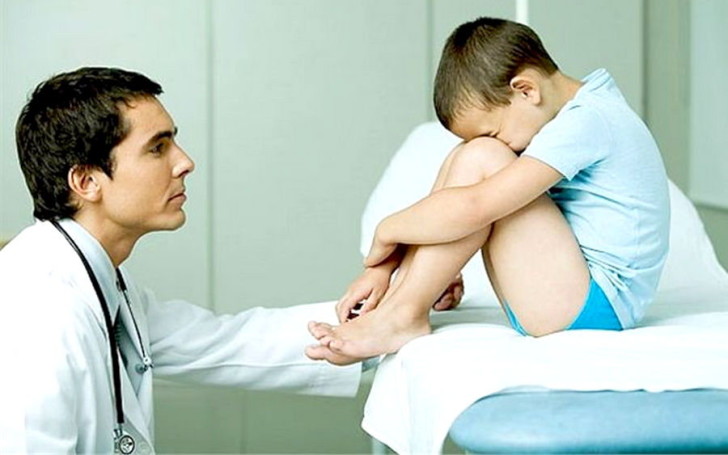 If the child pees in bed for quite a long time, then it is necessary to consult with a specialist.
If the child pees in bed for quite a long time, then it is necessary to consult with a specialist. Enuresis is called unconscious and involuntary urination, which occurs during the period of night or daytime sleep, and is diagnosed in a child older than 5 years. According to statistics, approximately 7-12% of children from 5 to 10 years old have this condition. It can be caused by a variety of ailments, and it is important to correctly determine which disease led to the appearance of enuresis.
In general, this pathology is primary or secondary. These conditions differ in that primary enuresis appears very early, when the baby has not yet learned to regulate the process of urination. Secondary enuresis is formed much later, it usually manifests itself at the age of 5-10 years, that is, after the child begins to go to the toilet on his own at night, but for some reason he suddenly starts to write to bed again. In the latter case, it is especially important to see a doctor as soon as possible, since this condition is not just a manifestation of an immature state of the nervous system, but is caused by some serious pathology that could appear against the background of a stressful state experienced by the child, neurosis or fear.
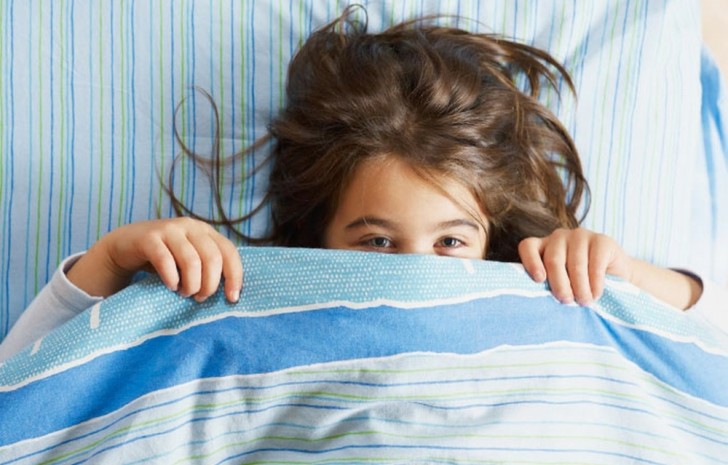 Enuresis in a child at an older age may be the result of certain diseases, so it is urgent to treat the child
Enuresis in a child at an older age may be the result of certain diseases, so it is urgent to treat the child | Disease | Main symptoms | Causes of bedwetting | Diagnostic methods |
| Urinary tract infections (kidney disease, cystitis). | Frequent urination in small portions. | The inflammatory process in the urinary tract and irritation of its walls cause the urge to frequent emptying. | A general urine test, the results of which can reveal the presence of inflammation. |
| Epilepsy | The child has convulsions during sleep, and they cause involuntary urination. In the morning, the baby may not even remember what happened to him at night. | In childhood, the disease manifests itself in the form of epileptic-like seizures, they occur against the background of increased excitability of the brain. | Modern medicine successfully treats epilepsy, but for an accurate diagnosis, the child must undergo a night examination. It is performed using a video camera and special devices that record the baby’s sleep and record changes in the performance of his brain. |
| Diabetes | The use of liquid in large volumes. Frequent urge to urinate. | Due to the use of a large volume of fluid, the brain simply does not have time to signal the need to empty. | You need to do a blood sugar test |
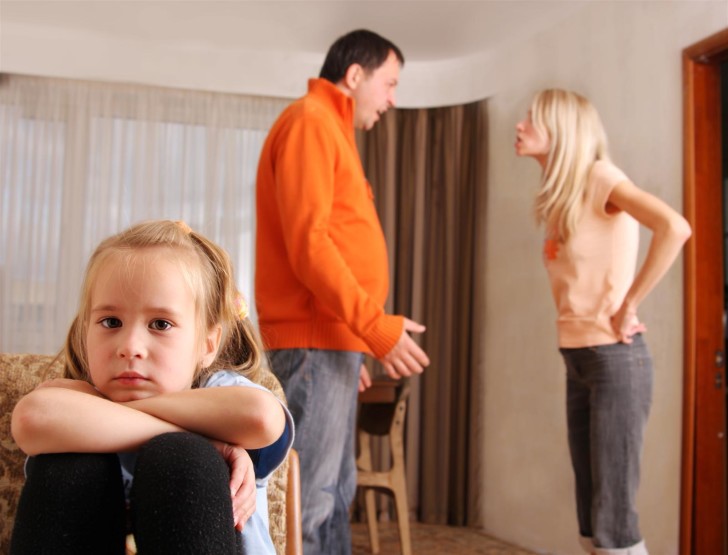 Frequent quarrels in the family can provoke a child, affecting health, including enuresis
Frequent quarrels in the family can provoke a child, affecting health, including enuresis The psychological reasons that can lead to the appearance of enuresis in crumbs include:
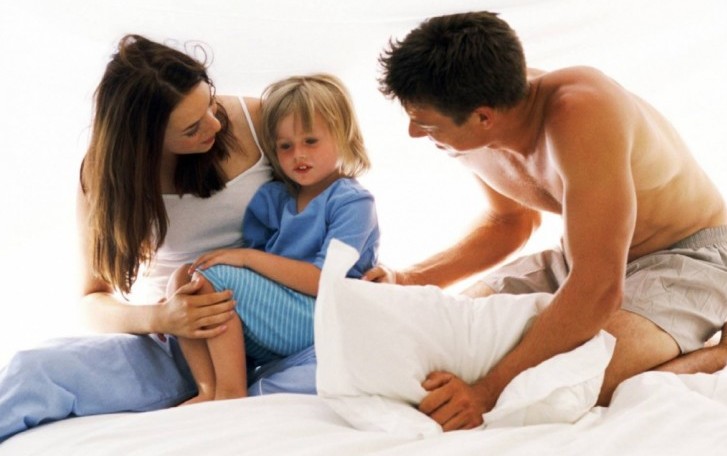 If the child peed at night, then it is necessary to support the baby, as the fear of punishment will only aggravate the situation.
If the child peed at night, then it is necessary to support the baby, as the fear of punishment will only aggravate the situation. Most pediatricians, including the well-known doctor Evgeny Komarovsky, recommend parents not to rush things. No need to look at other children and compare your baby with them, because every child is individual.
For example, if at 3 years old your baby still continues to urinate at night in bed, this is not a reason to worry. Put a diaper on your baby before going to bed, and let him sleep like that until he wakes up dry every morning.
In general, when such missteps happen to the crumbs, treat them philosophically, the older the child, the more he worries about such failures. Imagine that the irritation and discontent of the mother, which she will demonstrate, will be added to this. As a result, the feeling of guilt in the little man will increase several times, and the psychological complexes that have appeared as a result of everything that happens will only exacerbate the problem of urinary incontinence during sleep. How can you still help a baby at 3 years old or older and teach him not to pee while sleeping in bed?
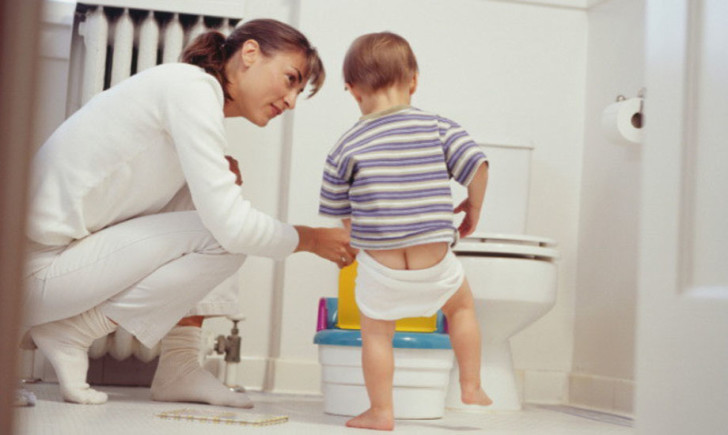 Until the baby learns to get up on the potty on his own at night, use diapers. Don't rush your child through this process.
Until the baby learns to get up on the potty on his own at night, use diapers. Don't rush your child through this process. If parents want to wean their child from sleeping in diapers, here are a few tips to help them keep their nights dry:
Parents need to show maximum patience in order to finally wean their crumbs from writing to bed at night. This is often not easy to achieve, but in no case should you be angry with the baby, yell at him and scold him, you should understand the causes of this phenomenon and try to eliminate them, you may need the help of a doctor.
It would be high time to part with diapers, but your child pees at night. Is it normal? Until what age does the baby have the right to nightly troubles, and when is a wet bed already a problem?
Let's start with the fact that modern parents often suffer from the desire to force the development of their children. Therefore, be vigilant and treat with healthy skepticism the stories of a neighbor that her daughter “asks” for a potty from four months old or persistent suggestions to start preparing a child for school from the age of three. Throughout childhood, the child gradually matures all organs and systems, and only by the age of sixteen does the body of a teenager begin to function in the same way as the body of an adult.
Young children learn to control the process of urination gradually. In an adult, as the bladder fills, a signal from it is sent to the brain, and the person experiences a conscious urge to urinate. If this happens at night, then the sleeper wakes up. In children, the formation of this process takes place, according to experts, during the first three to five years, and if up to five years a child pees at night from time to time in bed, this is absolutely normal. Moreover, such an “accident” can also occur during the day, if the child is enthusiastically playing or some other activity has completely captured his attention.
How should parents behave in such cases? If your child pees in bed or pants from time to time, do not scold or punish him in any way. Punishments here are meaningless, because the baby simply does not yet know how to fully control himself. Moreover, overly strict parents who are inclined to scold and punish their son or daughter for such “accidents” can just provoke neurotic enuresis in their child in the future.
If the "accident" happened during the day, just help the child change and kindly remind him that it is better to go to the toilet on time than to have trouble with wet panties. If the child pees at night, then make sure that you can quickly eliminate the consequences. To protect the mattress for a preschooler, it is better to lay an oilcloth and use blankets that can be washed. In order for the child not to be afraid to get up at night to use the toilet, leave a burning nightlight in the room.
Do not give your child too much liquid in the evening. Also avoid watermelons, sodas, and caffeinated drinks before bed. Make sure that the room where the child sleeps maintains a comfortable air temperature - children who are cold in their sleep pee much more often at night. In the spring-autumn period, it is better to put on warm pajamas for a child, since it is quite cool in rooms without heating, and children very often open up and begin to freeze during sleep.
Some parents try to keep the bed dry by potty training at night. However, experts do not recommend this method. In children, from these actions, the process of controlling urination will not form faster. But the child will experience discomfort from several forced nighttime awakenings for sure. To see this, just imagine that you were woken up three times during the night to force you to go to the toilet.
However, it happens that the child has already learned all hygiene skills and has not urinated at night for a long time, and suddenly starts to write in bed again. This is already a signal that something is wrong and parents will have to think about why the child pees at night again. Parents of children over three years of age who regularly wet the bed should also look for the cause of enuresis.

The cause of nocturnal enuresis in a child may be physiological problems. So, a child urinates at night with organic lesions of the spinal cord or brain, when the signal about a full bladder simply does not reach the brain. Enuresis also affects children with congenital malformations of the genitourinary system. However, such pathologies are usually detected by doctors quite early. If a dry bed has long become the norm for a child and suddenly he began to urinate at night, then you should consult a doctor and get tested for infections that lead to inflammation of the genitourinary organs. Nocturnal enuresis can be one of the symptoms of pyelonephritis, cystitis, or urethritis.
In children, infections of the genitourinary system can occur in a latent or erased form, therefore, if your child urinates at night, pay attention to whether he also has other symptoms of diseases of the urinary system: temperature rises without manifestations of SARS, periodic pains in the lower abdomen or in the lumbar region , lethargy, daytime "letting" of urine.
Enuresis in a child can also provoke constant psycho-emotional stress. The difficult atmosphere in the family, when adults constantly quarrel or live in a state of hidden conflict, often causes the child to urinate at night. Enuresis often affects children, to whom adults make excessive or conflicting demands. Such children are almost constantly in a state of psycho-emotional stress during the day, the psyche gets tired and complete relaxation, which comes as compensation at night, leads to the fact that the nighttime urge to urinate becomes very weak, and the child pees in bed. The complexity of such cases lies in the fact that parents may not always be aware of their own problems or pedagogical mistakes, and often sincerely believe that everything is fine in the family.
How to understand whether psycho-emotional problems in a child are the cause of nocturnal enuresis? If your baby has not found any infections and physiological abnormalities, and enuresis does not go away, then you should seek the advice of a neurologist and a good psychologist. A professional psychologist will definitely offer the child a number of drawing techniques that will fairly objectively allow him to judge the situation in the family. Most often, in cases of enuresis with a psycho-emotional nature, not only and not so much a child needs correctional work, but adults close to him. Drugs can stop enuresis, but if the situation in the family does not change, then the neurosis in the child will remain and after a while it can manifest itself in the form of bronchial asthma, allergies or some kind of phobia. Experts advise all parents to remember that the problems of children under eight years of age are a signal of obvious or hidden trouble in the family or problems in parent-child relationships.
Another reason why a child urinates is the appearance of a newborn in the family. In this case, enuresis is a kind of protest, expressed in regressive behavior (regression is a movement back into more childish forms of behavior). The child sees that everyone is touched by the newborn, he gets maximum attention and care, despite the fact that he can’t do anything, and besides, he also stains diapers. The protest behavior of the elder in this case can be expressed not only in wet sheets at night and panties during the day - the child may begin to speak worse, demand a pacifier or a bottle, be capricious over trifles.
In order to avoid such a situation, try to prepare the elder for the appearance of the baby in the house in advance. Do not lisp and do not be touched by a newborn in the presence of an older child, try to allocate time so that you can take a walk, read or go somewhere with the older child together at least from time to time. Emphasize how great it is to be big, because you can ride a bike, eat candy, play with friends, watch your favorite cartoons - and kids can't do all this. The most important thing here is not to scold the child, not to demand certain behavior from him just because he is the eldest. If you show patience, understanding children's feelings and manage to find time during the day that is intended only for the older child, the problem will gradually be resolved.
Some children who have started attending kindergarten have a hard time going through the adaptation period. Another daily routine children's team, the requirements of educators cause psycho-emotional stress and as a result, the child pees at night. A similar situation may arise during adaptation to school. Try to take it easy, do not scold the child for "accidents", explain to him that any changes in life cause anxiety - this is normal. Over time, a person gets used to the changes and stops worrying. Support the child during the adaptation period, help him cope with new impressions, and if the adaptation enuresis drags on, seek help from specialists. For starters, you should consult a pediatrician and a psychologist.